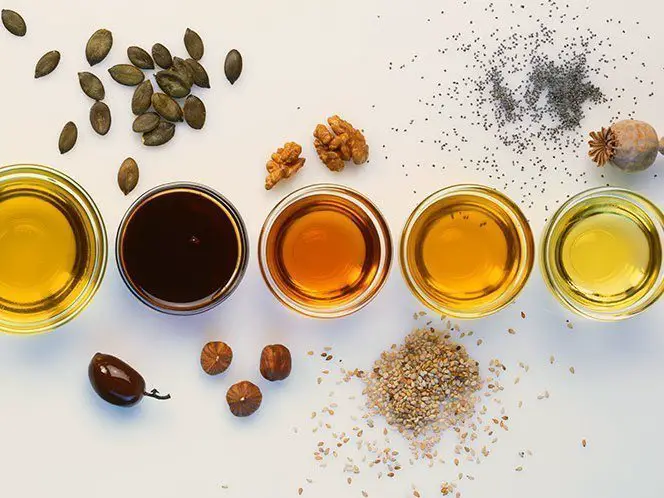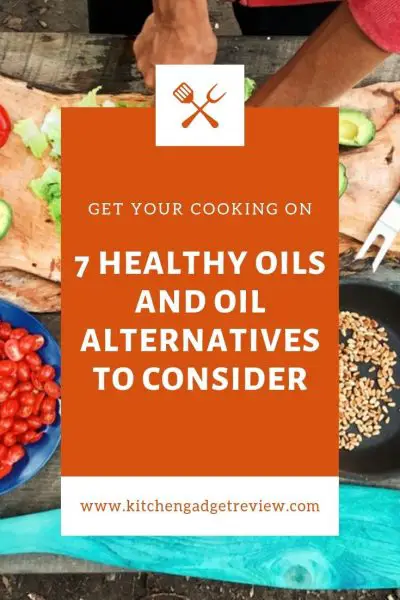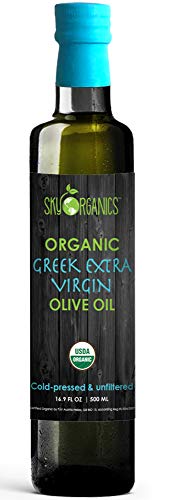Cooking oils have been under the controversial light as of late. The reason why this is due to the ongoing debate about their health benefits or lack thereof. Are there some healthy oils to consider? And can be find the healthiest cooking oil available today?
Some oils contain healthy monounsaturated and polyunsaturated fats, while others are made from unhealthy trans fats. And most of them are processed with chemical solvents. Therefore, we suggest you look for a healthier option and fortunately there are so several vegetable oil substitutes that you can choose from.
Keep on reading for all the answers to these questions as we’ll give you a rundown of the seven healthiest oils to cook with, along with three oil alternatives for baking that you might want to consider.

The healthiest oils
Healthiest Oils and Oil Alternatives: The Top 10 Picks
Not every vegetable oil substitute follows the same type of cooking and recipes. Some of them have stronger flavors than the rest, which could change the taste of your food. And others have low heat points and can’t be used for high-heat or baking cooking.
You’ll find that many oils offer a slew of health benefits, but keep in mind that most of them are also high in fat and calories. Even if some of the oils contain “healthy” fats, they can put some weight of consumed too much.
Healthy Oil #1: Olive Oil
We’ll start with the healthiest vegetable oil substitutes in olive oil (also check out: oil dispensing bottles if you like to keep some on your table or counter). As the name suggests, this oil is made from the fruit of the olive tree. This oil contains mostly healthy monounsaturated fats, which could help lower your chances of heart disease. It could also help regulate blood sugar.
However, not all olive oil is made equal. A 2016 CBS NEWs report states that most of the Italian olive oil found in supermarkets is fake. This report suggested consumers buy olive oil directly from Italian producers. They should also read the labels carefully to ensure the product comes from olive oil-producing Italian towns such as Puglia and Sicily.
Olive oil can be used in place of vegetable oils for marinades or dressings, and sauteed over low to medium heat. Though it’s not recommended for baking due to its strong flavor
- 100% pure extra virgin olive oil is cold pressed, unfiltered and sourced from small organic farmers...
- Our EVOO has been certified with a protected designation of origin seal, guaranteeing its origin and...
- The fact that our EVOO is unfiltered makes all the difference as it means all of olive oil’s...
- Our EVOO is ideal for cooking, as a salad dressing, or baking, and it also makes a great carrier oil...
- Guaranteed Fresh by Sky Organics
p.s. You may want to consider pairing an olive oil sauce with zoodles for a quick and healthy dinner. See: Zoodle Makers for our top picks.
#2: Flaxseed Oil
Flaxseed oil – also known as linseed oil – is made from the seeds of the flax plant and is a good source of soluble fiber. According to a 2015 animal study, flaxseed oil has been shown to have laxative effects and may help relieve constipation. There is some evidence which claims that it can also reduce cholesterol and lower heart disease, but more research is required.
However, flaxseed oil isn’t heat-stable shouldn’t be used as a vegetable oil substitute in recipes that require cooking over heat. It can be used especially in marinades and salad dressings (Check out top rated lettuce spinners). It’s also great for drizzling over grilled vegetables or other cooked foods before serving.
Healthy Oils: Some Top Picks to Cook With
Healthy Oils #3: Coconut Oil
Although coconut oil contains saturated fats, they are actually more neutral than the ones found in other foods. It also contains a saturated fat known as lauric acid that may raise “good” cholesterol levels.
In order to substitute for vegetable oil, you need to use the same amount of coconut oil as vegetable oil. And since coconut oil is solid at room temperature, you have to melt the oil, especially if your recipe requires liquid oil. Make sure the other ingredients aren’t too cold or they could end up re-solidifying the coconut oil.
Note that coconut oil has a rich, vanilla-like flavor, which is a delicious alternative for baked goods, but might not be right for every recipe.
- USDA ORGANIC & FAIR TRADE INGREDIENTS ONLY: Dr. Bronner’s Regenerative Organic Certified Virgin...
- DR. BRONNER'S ORGANIC VIRGIN COCONUT OIL IS VERSATILE: Our Virgin Coconut Oil is perfect for...
- CLIMATE-FRIENDLY FARMING: Our sister company in Sri Lanka works with farmers to implement...
- OUR TWO COCONUT OILS: Our White Kernel Coconut Oil has the brown inner skin removed for a milder...
- NOW, REGENERATIVE ORGANIC CERTIFIED: Our coconut oil is pioneering Regenerative Organic...
#4: Avocado Oil
Avocado oil is made from pressed avocado pulp. It mostly contains oleic acid, a healthy monounsaturated fat. It’s even a good source of antioxidants that fight free radicals in the body.
According to a 2005 study, avocado oil may help lower blood pressure. Another study from the same year revealed that avocado oil helps boost carotenoid absorption in salsa and salads. Carotenoids like lutein and beta carotene are linked to eye health and could help reduce the risk of some cancers.
Avocado oil has a noticeably creamy, buttery taste and has a smoke point. It’s ideal for:
- Marinades
- Grilling
- Sauces
- Dressings
- Stir-frying
- Baking
- Sautéing
- Sauces
You can substitute avocado oil for vegetable oil in equal amounts. Though unlike other vegetable oil substitutes, avocado oil isn’t that easy to find at local grocery stores. You’ll have better luck with most natural health food stores as they keep it in stock.
#5: Canola Oil
Canola oil has a bit of a bad rap these days because people view it as “fake” or ultra-processed type of oil. However, in reality, it’s no better or worse than most other oils out there when keeping these things in mind.
What canola oil does have going for it is that it’s low in saturated fats, and it also has a neutral flavour which makes it a nice option for deep frying, roasting or baking. However, the lack of flavour makes it not the best choice for salad dressings or sautéing.
#6: Vegetable Oil
Similar to canola oil is vegetable oil. What makes it one of the healthiest oils is the low amount of saturated fat in it. It also has a high smoke point and neutral taste due to the chemical processing. However, this process can also deplete the mineral content which is why it’s not higher up on our list of the healthiest oils to cook with.
#7: Safflower Oil
If you’re a little bit leery of canola and vegetable oils because of the processing, then another healthy oil to cook with might be safflower oil. It’s healthy because it’s low in saturated fat, and has a ton of omega-9 fatty acids. Besides that, it has a high smoke point and neutral flavour which makes it super easy to cook with.
You can find safflower oil that’s either chemically processed, or cold-pressed in a similar way to olive oil. But have the same health benefits.
But, what about oil substitutes? Let’s get into the top 3 options for oil alternatives.
Of course, you can’t use these oil substitutes for frying an egg or something like that. However, if you’re doing some baking, then you may want to consider one of these top options to replace oil in a recipe.
#8: Applesauce
Applesauce is another favorite if you’re looking for a quick and healthier vegetable oil alternative. It’s commonly used for baked dishes as it gives them more flavor and moisture.
Applesauce trumps vegetable oil in nutritional value as it contains fiber and vitamin C. It also has fewer calories. Although consuming it in excess still isn’t good for your health.
If you’re planning to get this substitute, just be sure it’s unsweetened and organic as the ones sold commercially might contain too much sugar and high-fructose corn syrup.
Applesauce is a convincing substitute for vegetable oil, especially for recipes including carrot cake, spice cake, gingerbread cake, chocolate cake, and quick bread recipes.
To make it a good vegetable oil substitute, use about ¾ of the amount of oil that you need for the recipe. If the batter’s too dry, then add a tablespoon or more.
#9: Yogurt
Unlike other substitutes, replacing vegetable oil with yogurt isn’t easy. That’s because it could be hard to get the ratios right on the first go. But still, it’s one of the best substitutes due to its nutritional value.
Yogurt makes a good vegetable oil substitute for recipes like salads and baked goods. But it’s like a double-edged sword where it can either improve the texture of your food or ruin it. This depends on how well you incorporate yogurt into your recipe.
Lower Calorie Substitutes for Oil When Baking
#10: Butter
Most people might resent using butter as a vegetable oil substitute, probably due to it being high in calories. But it actually has relatively better nutritional value than the processed alternatives.
And as of recently, more and more people are understanding and seeing the benefits of using butter. It’s great if you want to add more flavor to your food and a good source of monounsaturated fat. Butter is also rich in vitamins A, D, and E.

Healthier Oils to Consider
Need More Tips and Tricks for Healthier Eating?
Have your Say about Healthy Oils and Oil Substitutes
What are your thoughts about healthier oils to consider. Or, do you use an oil substitute when you’re baking? Leave a comment below and let us know what you think. We’d love to hear from you.
Also be sure to give this article a share on Facebook, Twitter, or Pinterest. It’ll help other people trying to live healthier find this useful resource.
Last update on 2021-04-09 / Affiliate links / Images from Amazon Product Advertising API


